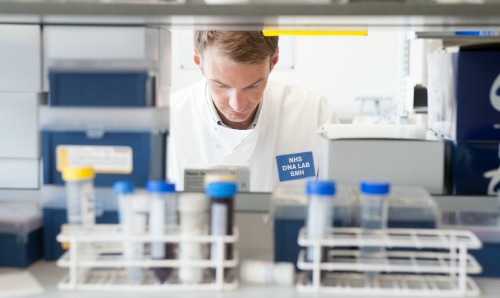Helping more women to survive breast cancer
Currently, one in eight women will develop breast cancer in their lifetime. University of Manchester research has led to revolutionary changes in treatment that give these women a better chance of survival – and given hope that fewer women will develop the disease in the future.
Global problem: women’s most common cancer
Research beacon breakthroughs
Find out how world-class academic research is commercialised by scientists, engineers, medical professionals, business leaders and policymakers at Manchester.
More than 1.7 million women develop breast cancer every year.
The most common cancer in women worldwide (the second most common cancer overall), it represents around 25% of all cancers in women – and it is the most common cause of cancer mortality among middle-aged women.
Breast cancer survival is improved by early detection and the use of systemic therapy given after surgery.
Endocrine therapy (treatment that blocks the body’s natural hormones) can prevent relapse and improve survival, and can also extend the duration of survival after systemic relapse.
Breakthroughs in this area are therefore both life-changing and life-saving.
Manchester solution: the world’s number one endocrine treatment
Manchester researchers have developed new approaches to endocrine therapy that have revolutionised breast cancer treatment worldwide.
“Through extensive close collaborative clinical and laboratory work with colleagues at locally based AstraZeneca, Manchester researchers have successfully improved treatments over the years. Today, more women presenting with early breast cancer are cured, remission in advanced disease lasts longer and survival is prolonged."
Tony Howell / Professor of Breast Oncology
In the 1970s we developed a breakthrough therapy using tamoxifen, an anti-oestrogen drug that blocked oestrogen receptors in tumours, which meant that the cancer grew more slowly or stopped growing altogether.
Manchester research from the 1990s led to clinical trials showing that fulvestrant, another anti-oestrogen drug, was effective in women with advanced breast cancer who had become immune to tamoxifen.
Working with AstraZeneca, our team went on to show that anastrozole, another hormone therapy, outperformed tamoxifen in preventing the relapse of breast cancer. Anastrozole proved to be a breakthrough drug that is now the major endocrine therapy for breast cancer.

Professor Tony Howell, Professor of Breast Oncology, has worked in cancer research at Manchester since the 1980s. He says: “Through extensive close collaborative clinical and laboratory work with colleagues at locally based AstraZeneca, Manchester researchers have successfully improved treatments over the years.
"Today, more women presenting with early breast cancer are cured, remission in advanced disease lasts longer and survival is prolonged. Furthermore, we have demonstrated that approximately half of breast cancer is preventable.”
Life-changing impacts
The University’s research into new approaches to endocrine therapy has resulted in:
- anastrozole being adopted as the world’s major endocrine therapy;
- changes in clinical practice that are now national guidelines, and help to set international treatment standards;
- more women with breast cancer being cured, longer-lasting remissions and improved post-surgery survival, giving more women across the world their lives back.
Find out more
This randomised trial of breast cancer prevention shows that women who took anastrozole for five years had 50% less breast cancer than women taking a placebo:
- 'Anastrozole for prevention of breast cancer in high-risk postmenopausal women (IBIS-II): an international, double-blind, randomised placebo-controlled trial'. Cuzick J, Sestak I, Forbes JF, Dowsett M, Knox J, Cawthorn S, Saunders C, Roche N, Mansel RE, von Minckwitz G, Bonanni B, Palva T, Howell A; IBIS-II investigators. Lancet. 2014 Mar 22;383(9922):1041-8.
These are the long-term results of a trial comparing tamoxifen with placebo for breast cancer prevention, which show that the reduction in the risk of breast cancer produced by giving tamoxifen for five years lasts for up to 20 years:
- 'Tamoxifen for prevention of breast cancer: extended long-term follow-up of the IBIS-I breast cancer prevention trial'. Cuzick J, Sestak I, Cawthorn S, Hamed H, Holli K, Howell A, Forbes JF; IBIS-I Investigators. Lancet Oncol. 2015 Jan;16(1):67-75.
This result shows the superiority of anastrozole to tamoxifen when given after surgery for breast cancer; there was a reduction of more than 20% in the time to recurrence and a 42% reduction in new cancers in the other breast in women taking anastrozole compared with tamoxifen:
- 'Results of the ATAC (Arimidex, Tamoxifen, Alone or in Combination) trial after completion of 5 years' adjuvant treatment for breast cancer'. Howell A, Cuzick J, Baum M, Buzdar A, Dowsett M, Forbes JF, Hoctin-Boes G, Houghton J, Locker GY, Tobias JS; ATAC Trialists' Group. Lancet. 2005 Jan 1-7;365(9453):60-2.
This study shows that anastrozole is superior to tamoxifen in preventing a relapse after surgery for breast cancer, even after ten years of follow-up:
- 'Effect of anastrozole and tamoxifen as adjuvant treatment for early-stage breast cancer: 10-year analysis of the ATAC trial'. Cuzick J, Sestak I, Baum M, Buzdar A, Howell A, Dowsett M, Forbes JF; ATAC/LATTE investigators. Lancet Oncol. 2010 Dec;11(12):1135-41.
Meet the researchers
- Professor Anthony Howell, Professor of Breast Oncology
- Professor Nigel Bundred, Professor of Surgical Oncology
